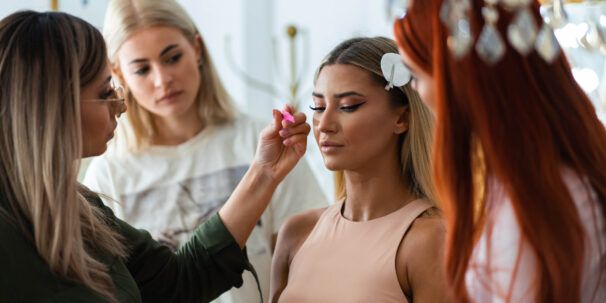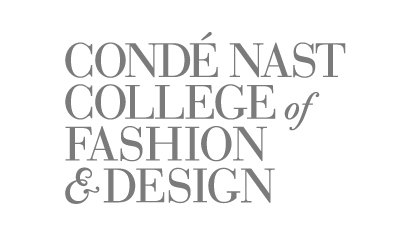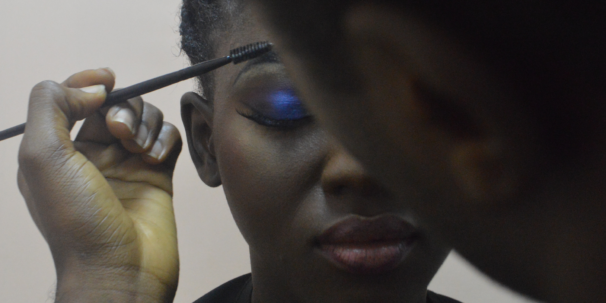How to get a job in the beauty industry
Experts in the beauty industry give us their top tips and insight on how to build your beauty career, what the work involves, and how to specialise to get ahead in a competitive industry

Jobs in the beauty industry have changed significantly in recent years. Today, a beauty career is an opportunity to express yourself creatively, flex your business acumen and meet clients who may go on to become lifelong friends.
But beauty is a competitive industry, and you’re likely to flounder without the right soft skills and beauty certifications.
So how can you build a successful career in beauty? To help us out, we got expert insight from Teresa Beazley, owner of Luron Beauty and Heather King, director of colour at Radio London Hair Salon.
How do you choose a job in the beauty industry?
The modern beauty industry is vast. With so many beauty industry jobs available, how do you decide what to specialise in?
“Gone are the days when people who chose a career in hairdressing and beauty only coiffed manes or painted nails,” says Teresa Beazley.
“It used to be viewed as a ‘catch-all’ option for those who didn’t really know what they wanted to be. Now, there are so many opportunities, from master colour expert to facialist and everything in between.”
If you are considering beauty as a career you could follow demand and go into the sector with the most available jobs. But you are more likely to stick with your new beauty career if you choose something you feel enthusiastic about. For Teresa Beazley, her personal interest became a professional passion.
“Pick something close to your heart,” she says. “I chose skin health – more specifically, challenging premature ageing without dermal filler and anti-wrinkle procedures – because I knew it would benefit me as I got older. I knew there would be people looking for the same solutions, so I focused my attention on that rather than following the masses into traditional injectables.”
“I wanted to harness the body’s ability to regenerate using a range of techniques and organic products, so people still looked like themselves. I wanted to identify a problem and be the way to fix it.”
If you are thinking about beauty sectors you could find stimulating long-term, here are some examples of the many job roles in the beauty industry:
● Hairstylist/barber
● Colourist
● Salon manager
● Makeup artist
● Department store assistant at a makeup or skincare counter
● Manicurist (also known as nail technician)
● Aesthetician (also known as facialist, skincare specialist)
● Eyelash/Eyebrow technician
● Marketing specialist for a beauty company




What are the pros of a beauty career?
The satisfaction of helping others
Most beauty therapy jobs give you the opportunity to help clients in an immediate, tangible, and rewarding way. In the case of hair stylists and makeup artists, the results are instantly measurable, and you will receive direct feedback when you see your clients’ reactions to their transformation. For skin therapists like Beazley, the results may not be quite so instant – making it all the more satisfying when they come through.
“Hearing back from clients months later that they no longer worry about their foundation running because they don’t wear it anymore, or that friends they haven’t seen for a while are asking what they’re doing because they have a ‘glow’ – I get such a sense of achievement from being part of their journey to healthy skin,” says Beazley.
Potential for creative expression
Most careers in beauty involve practical work – you won’t be stuck behind a computer for eight hours a day, as you are in an office job. Many jobs offer opportunities to express yourself creatively, whether through nail art or makeup.
What are the challenges involved in a beauty career?
Long and unconventional hours
Beauty industry jobs typically involve long hours, as well as unconventional ones. Peak demand for beauty treatments tends to be on evenings and weekends, when most ‘nine-to-fivers’ are off work. You’ll also experience busy periods during the summer wedding and Christmas party seasons, where you may find yourself working six or seven days per week.
Physical demands on the body
“Every role involves lots of walking and standing,” says Beazley.
“As a skin therapist, I spend a lot of time hunched over someone else’s face so I try to take time to stretch between appointments.”
Mindfulness practices, self-care, and relaxation techniques can help you cope with mental and physical stress.
High competition for jobs
Despite the increase in beauty industry opportunities, the number of people wanting to enter the industry has increased along with it – so make sure you stand out with the right beauty certifications and perhaps some experience in a tangentially related role (such as beauty retail for makeup artist jobs).
“I made the choice to be self-employed, which comes with its own challenges, but competition for entry-level beauty jobs in companies, especially well-known large ones, can be fierce,” says Beazley.

What “soft skills” are required for a job in the beauty industry?
Passion
“I think it’s passion,” says former beauty educator Heather King, when asked what distinguished the students who went on to succeed in their beauty careers.
“The ones who want to do it will do it, the ones who don’t won’t.”
If you’re truly excited about your chosen career path, you’ll stick with it even when times get hard.
Critical observation
“Observe as much as you can,” says King.
“Use every asset available to learn and absorb information until you can find your own voice. This takes time and patience, but once you know who you are and the professional you want to be, your opportunities will be limitless.”
Problem-solving
In the beauty industry, you’ll serve hundreds of clients with vastly different needs. Whether you’re working directly with them or simply recommending a product, you’ll need to pay close attention to what your client says as well as their physical features.
“I’m a natural problem solver, so being able to speak to a client, understand their current skin concerns, identify why things aren’t working for them, agreeing a suitable treatment and then experiencing their excitement when it works – it’s one of the greatest feelings of all time,” says Beazley.
Good business sense
You’ll need to have good business savvy to work in the beauty industry – even more so if you’re going self-employed. Access online courses on finances, networking and productivity through a platform like FutureLearn, and study all you can.
“You need to know how to grow your business and make a long-lasting career,” says Heather King.
Confidence
Confidence is not something we’re necessarily born with or without – it can be acquired over time. And in work situations, the best way to gain confidence is not to work on your attitude directly, but instead to learn as much as you can and therefore gain confidence in your abilities.
“Oftentimes, I found myself having impostor syndrome. Negative self-talk really got the best of me,” says King.
“But I found that grounding myself in education and deciding the type of stylist I wanted to be made a huge difference. It took me a while to get there, and I’ve changed my approach a million different times as I grew and my tastes changed – but once I settled in, that’s when things really started to flow.”


How to get certified as a beauty therapist
“The volume of training providers has exponentially increased to keep up with demand, so choosing a specific area to develop my skills in wasn’t the biggest decision I had to make – it was where and with whom I entrusted my time to retrain,” says Beazley.
She spent months researching training providers and beauty courses across the UK, finally settling on a local organisation offering flexible learning packages, resulting in formally recognised qualifications from Ofqual.
You don’t need to look far to find colleges offering formal beauty courses – chances are there’s one in your area. And if you want to find out a bit more about the industry before diving in, check out our The Business of Beauty course – part of our The Future of Fashion and Media with Condé Nast ExpertTrack.
How to retrain for a beauty industry job from another career
The coronavirus pandemic has led many people to reassess their life and work priorities – and in doing so, change their careers. The beauty industry, with its potential for creative expression and flexible working, has become one of the prime beneficiaries of career-changing Brits – including Teresa Beazley, who, in her forties, left a successful career to retrain as a skin therapist.
“It’s never too late,” she says.
“A career of 20-plus years in business support, organisational development and HR, a pandemic later – and here I am, starting on a new journey at 41. Don’t be scared to make that change and take a leap of faith. Yes, it’s hard and sometimes you’ll question why you bothered, but when your first client writes a review about how great you are, it will be worth it.”
Unless you’re sitting on a vast store of wealth, however, it’s best to stay in the day job until you have the qualifications and contacts required to make the leap.
“It was hard to work full-time in a completely unrelated industry while retraining, but I needed to so I could continue to pay my bills,” says Beazley. “Having the support to dedicate time and energy to writing assignments, researching new techniques and undertaking practical assessments was one of the main reasons I was able to get two Level 4 qualifications in nine months.”
Going it alone: how to set up your own business in the beauty industry
Set up your new business on the back of an existing one
Rather than risking your capital on your own venue, ask local beauty businesses if they have a room to spare – you can provide eyebrow and lash treatments in the back room of a nail salon, for instance. It’s common practice and benefits both of you, as clients start to see the venue as a one-stop shop for all of their beauty needs. Teresa Beazley’s Luron Beauty started life in a local hair salon, where Beazley offered her skin therapy services to their customers.
Establish an online presence
You don’t need loads of tech savvy to get established online, but you will need a website. Unless you’re a web design expert – or want to become one – you’re better off paying upfront for a complete website-building product such as Wix or Squarespace. It’s more expensive than DIY options such as WordPress, but the simplicity and superior customer support will save you time and headaches down the line.
Learn the basics of Search Engine Optimisation (SEO) and keyword research – this will help you to boost your website further up Google rankings and gain more exposure for your fledgling business.
You’ll also need to set up some social media channels. Instagram, Facebook and TikTok are all a good bet as they’re heavily pictorial, but it depends on your target market (as a general rule, Gen Z are the TikTok generation, millennials prefer Instagram, and Gen X and Boomers are avid Facebook users).
Know your target market
“Knowing your target market is absolutely key. It took me a long time to work out that I couldn’t be the solution to everyone’s problem,” says Beazley.
Your target market depends on several factors. One of these is location. Have you set up shop in a city centre or a remote village? Find out the demographics of your surrounding area and adjust your services and marketing efforts accordingly.
Check out industry statistics on demographics and trends, such as this report from PolicyBee. This will help you to promote the treatments that are most popular at that moment.
Spread the word
“I have worked in a number of sectors before beauty and I can safely say, it’s one of the only markets that relies heavily on word of mouth,” says Beazley.
Local and online advertising will get you some business, but most people trust their friends’ experience most. Offering a ‘refer-a-friend’ discount is a great way to get new clients and doesn’t cost as much as formal advertising.
Get some business cards made through a service such as MOO and always have them to hand. You never know when you’ll have an opportunity to hand them out.
Most importantly, be as authentic as you can in all your marketing efforts, whether online or offline.
“People buy from people – they don’t purchase the treatment itself,” says Beazley.
“Tell a story in your advertising and don’t be afraid to let your personality shine through.”
Final thoughts
With so many opportunities available, there’s never been a more exciting time to be in the beauty industry. The industry is competitive, but with the right qualifications and attitude you’ve got a great chance of becoming successful.
“The best leaders in the beauty industry were once right where you are now,” says Heather King.
“They paved the way by learning as much as they could, while still being their unique selves. Don’t let someone else’s journey dictate yours. Take from them what resonates and leave what doesn’t.”








